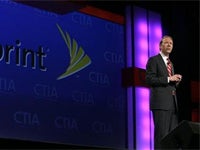 |
| Sprint CEO Dan Hesse Source: Reuters |
Sprint Nextel (NYSE: S) may be making strides in pushing data services and cutting down on its customer churn, but the No. 3 U.S. carrier is still losing money — and CEO Dan Hesse admits there’s still a great deal of work ahead.
The company reported second-quarter results today, showing that efforts to improve customer service are paying off. But a 11 percent revenue drop, to $9.06 billion, caused it to miss analysts’ revenue expectations of $9.17 billion.
The Overland Park, Kan.-based carrier reported a loss of $344 million, or 12 cents per share, during the second quarter compared to the second quarter of 2007, when it earned $19 million, or 1 cent per share.
The company said it had 51.9 million customers this quarter, compared to 54.0 million last year at this time — cementing its position in third place behind market leader AT&T and Verizon Wireless, both of which reported positive quarterly financial results earlier in the summer.
Both rivals attributed a large part of their staying power to success in promoting data services, which carriers are finding important to gaining and retaining valuable customers — since calling plans with data typically cost more than voice-only services, and data users are more active with devices, according to industry observers.
Last week, AT&T executives noted that its 16.1 percent growth in wireline Internet data revenues was driven by strong increases in consumer video and broadband revenues, and in business services such as virtual private networks, managed Internet services and hosting. Verizon Wireless, likewise, attributed its second quarter strong growth to demand for data services as the primary stimulator as well.
Although Sprint did not provide specifics on its data revenues during its call, executives reiterated that wireless data services were key to its future.
“We obviously have to have great voice, but it’s the data where the market is going and where we are performing well,” said John Garcia, president of Sprint’s CDMA business unit.
Despite its less-than-stellar financials, Hesse was optimistic during today’s conference call with analysts, pointing to success with Sprint’s latest rate plan, Simply Everything, which he credited for spurring greater mobile data services use.
He also described making headway in improving customer retention and support.
“We’re eliminating reasons for customers to call the support center and our churn levels are the lowest in two years,” Hesse said, citing churn as just under 2 percent — down from 2.45 percent in the first quarter. Hesse said 80 percent of support calls are now solved in less than 30 seconds.
“It’s going to require us to execute better,” Hesse said. “We have a companywide effort to reduce churn and drive down support calls. It will take time for us to get to the levels we want and on parity with the big two,” referring to market leader AT&T and Verizon Wireless.
Slowed to a walk?
Sprint’s quarterly performance continues to show that the carrier — unlike the market leaders — faces challenges tied to sluggish economy and longer enterprise sales cycles, as well as customer support problems lingering from before Hesse came on board.
AT&T (NYSE: T) posteddouble-digit revenue growth for its second-quarter financials and reported more than a million new subscribers. It added 1.3 million new subscribers in the second quarter and has a 1.1 customer churn rate.
Verizon posted earnings of $1.88 billion, up from last year’s second-quarter earnings of $1.68 billion. The carrier added 1.5 million subscribers during the quarter, bringing its base to 68.7 million.
While Sprint Nextel’s wireless business reported a 12.5 percent decline in revenue to $7.7 billion, and a loss of 901,000 subscribers that included 776,000 monthly subscribers, the statistics are better than first quarter, when it reported losing 1.1 million subscribers.
“Our three goals are to improve customer experience, rebuild the brand and increase profit,” Hesse said. “We’ve done well in all those areas.”
Looking forward, however, the carrier expects losses to be deeper though it projects better cash flows in the second half of the year despite new products, such as the Instinct, which Sprint said is on par with Apple’s iPhone for its ability to spur wireless data usage.
“We haven’t turned the corner yet and it will take some time but we have a clear plan,” Hesse said. “What we offer in price, network and data services is a very, very good value compared to the iPhone,” he added.
In spite of Hesse’s enthusiasm, shareholders appeared unimpressed with Sprint’s results by day’s end. Its shares fell $1.21, or 14.2 percent, to close at $7.34 Wednesday.


